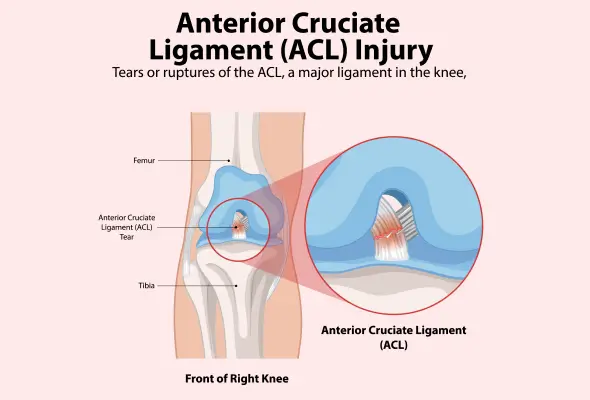-
Doctors
-
Specialities & Treatments
Centre of Excellence
Specialties
Treatments and Procedures
Hospitals & Directions HyderabadCARE Hospitals, Banjara Hills CARE Outpatient Centre, Banjara Hills CARE Hospitals, HITEC City CARE Hospitals, Nampally Gurunanak CARE Hospitals, Musheerabad CARE Hospitals Outpatient Centre, HITEC City CARE Hospitals, Malakpet
HyderabadCARE Hospitals, Banjara Hills CARE Outpatient Centre, Banjara Hills CARE Hospitals, HITEC City CARE Hospitals, Nampally Gurunanak CARE Hospitals, Musheerabad CARE Hospitals Outpatient Centre, HITEC City CARE Hospitals, Malakpet Raipur
Raipur
 Bhubaneswar
Bhubaneswar Visakhapatnam
Visakhapatnam
 Nagpur
Nagpur
 Indore
Indore
 Chh. Sambhajinagar
Chh. SambhajinagarClinics & Medical Centers
Book an AppointmentContact Us
Online Lab Reports
Book an Appointment
Consult Super-Specialist Doctors at CARE Hospitals

ACL Reconstruction Treatment in Bhubaneswar
ACL Reconstruction Treatment in Bhubaneswar
ACL reconstruction in Bhubaneswar
ACL Reconstruction Treatment is a surgical procedure that repairs a torn anterior cruciate ligament (ACL) in the knee. The anterior cruciate ligament connects the femur (thighbone) to the tibia (shinbone). The ACL is one of the major ligaments in the knee, providing stability and preventing excessive forward bending of the tibia relative to the femur.
For individuals seeking ACL reconstruction treatment in Bhubaneswar, it is essential to consult with best orthopedic surgeons in Bhubaneswar specializing in this procedure to ensure optimal outcomes and rehabilitation. CARE Hospitals is the 1st hospital to introduce Sports Injury & rehabilitation department in Odisha and is equipped with best sports medicine doctors in Bhubaneswar.

What is an ACL Injury?
An ACL injury refers to the tearing or overstretching of the anterior cruciate ligament in the knee. Unanticipated movements, such as sudden stops or changes in direction, direct impact on the knee, or excessive twisting of the knee joint, can cause ACL injuries. Due to the nature of these activities, athletes who engage in sports like basketball, soccer, and football are more likely to have ACL injuries.
Reasons for ACL Tear
There are several reasons why an ACL tear can occur. One of the primary causes of an ACL tear is sports-related injuries, particularly those activities that put unduly pressure on the knees, such as:
- Slowing down suddenly and changing directions while running
- Pivoting with your foot firm on the ground
- Landing clumsily from a jump
Other causes of an ACL tear include trauma, like a direct blow to the knee, or accidents like falls or car crashes.
What are the Symptoms of an ACL Tear?
When an ACL tear occurs, individuals may experience various symptoms, such as:
- One of the most common signs is a popping sound or sensation at the time of injury.
- Instant swelling
- Severe pain and tenderness in the knee
- The knee may feel unstable or give out during activities, making it difficult to bear weight or engage in physical exercise.
- Limited range of movements
When is ACL Reconstruction Surgery Needed or Recommended?
Best orthopaedic doctors recommend ACL reconstruction surgery for people who experience persistent symptoms and significant knee instability after an ACL tear. The decision to undergo surgery is made after a thorough assessment by a qualified orthopaedic doctor. Before recommending surgery, doctors consider factors such as the individual's activity level, age, overall health status, severity of the situation, and expectations.
Diagnosis of ACL Tear
When an ACL tear is suspected, the orthopaedic doctor will perform various diagnostic tests to confirm the diagnosis, including:
- The doctor will inquire about the patient's manifestations, including the mechanism of injury, onset of pain, and activities that exacerbate or alleviate symptoms.
- A thorough physical assessment in which the doctor evaluates the knee's stability and range of motion.
- Imaging tests such as X-rays, MRI, or arthroscopy provide detailed images of the knee joint and surrounding structures, allowing the doctor to assess the extent of the tear and identify any associated injuries.
ACL Reconstruction Procedure
Before the Surgery
Before ACL reconstruction surgery, the orthopaedic doctor will comprehensively evaluate the patient's knee. This evaluation may involve physical examinations, imaging tests such as an MRI, and discussions about the patient's medical history. Preoperative instructions, including fasting guidelines and medication restrictions, will be provided to ensure a safe surgical procedure.
During the Surgery
The ACL reconstruction procedure typically involves the following steps:
- Anaesthesia: The surgeon will perform ACL reconstruction surgery under general anaesthesia. It ensures the patient's comfort and oblivion during the surgery.
- Incision placement: The surgeon makes small incisions around the knee to access the torn ACL.
- Graft preparation: The surgeon will harvest graft from the patient's hamstring, patellar tendon, or donor source. They will trim and prepare the harvested graft according to the appropriate size and shape for ACL reconstruction.
- Graft replacement: The surgeon will replace the torn ligament with the harvested graft. They will secure graft in place using screws or other fixation devices. The surgeon will then close the incisions and stabilise the knee with a brace or bandage.
After the Surgery
Following ACL reconstruction surgery, the doctor will closely monitor the patient in the recovery room, depending on the surgeon's recommendation. They will prescribe pain medications to manage any discomfort. Physiotherapy and rehabilitation will play a crucial role in the recovery process to restore knee strength, range of movement, and stability to the knee.
Risks of ACL Tear Surgery
Like any surgical procedure, ACL tear surgery carries certain risks. These risks include infection, bleeding, blood clots, damage to blood vessels or nerves, and adverse reactions to anaesthesia. The orthopaedic surgeon will discuss these risks with the patient before the surgical procedure and take appropriate measures to minimise them.
Recovery after ACL Tear
Recovery after ACL tear surgery is a gradual process that requires patience and dedication. Initially, the patient will need to use crutches and a knee brace to support the knee while it heals. Physical therapy will be essential to the recovery process, focusing on strengthening the muscles around the knee, improving the range of motion, and gradually reintroducing activities. The duration of the recovery period can vary depending on the individual, but it typically takes several months before the patient can return to sports or rigorous physical activities.
Conclusion
ACL tear treatment in Bhubaneswar is a highly effective solution for individuals suffering from ACL tears. By undergoing surgery and following a comprehensive rehabilitation program, patients can regain stability, minimise pain, and return to their desired level of physical activity. It is crucial to consult a qualified orthopaedic doctor specialising in ACL reconstruction surgery in Bhubaneswar to ensure the best possible outcome.
Why choose CARE Hospitals for ACL Reconstruction Treatment?
CARE Hospitals can be a best choice for you for ACL reconstruction treatment due to its advanced facilities and expert orthopedic team. They ensure excellent outcomes with high success rate in surgeries while prioritising patient's well-being at all times.
FAQ's
1. Is ACL reconstruction a major surgical procedure?
ACL reconstruction is considered a major surgery due to its invasive nature and complexity. It requires general anaesthesia and involves removing and replacing the torn ACL.
2. What is done in ACL reconstruction?
ACL reconstruction involves removing the torn ACL and replacing it with a graft. The graft may be taken from the patient's own tissue or a donor source. The new graft is then secured in place using screws or other fixation devices.
3. How long does it take to recover from ACL reconstruction?
The recovery period after ACL reconstruction surgery can vary depending on the person and the severity of the injury. Generally, it takes several months of physical therapy and rehabilitation to recover and fully return to sports or rigorous physical activities.
4. Is ACL Surgery painful?
ACL surgery is performed under general anaesthesia so patients do not experience pain during the procedure. During the recovery period, patients commonly experience discomfort and pain, which the orthopaedic doctor manages by prescribing pain medications.
5. Is ACL injury serious?
Yes, an ACL injury is considered severe as it can significantly affect an individual's ability to engage in physical activities and may cause long-term complications if left untreated.
6. Can ACL tears heal naturally?
Unfortunately, an ACL tear cannot heal naturally on its own. The torn ligament needs to be surgically repaired or reconstructed to restore stability and function to the knee.
7. What not to eat after ACL surgery?
Following a healthy, balanced diet is crucial to supporting the healing process after ACL surgery. It is advisable to avoid foods that can increase inflammation, such as processed foods, sugary snacks, and excessive amounts of red meat. Instead, focus on consuming nutrient-rich foods, including fruits, vegetables, lean proteins, and whole grains.
8. Can you walk with ACL damage?
Walking with ACL damage can be challenging and may cause pain and instability. Seeking medical guidance and following the recommended ACL tear treatment plan, which may include surgery and rehabilitation, is essential to restore normal function to the knee.
Still Have a Question?

